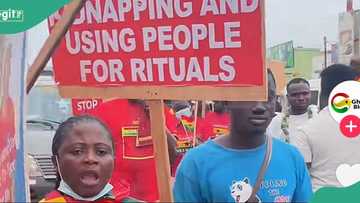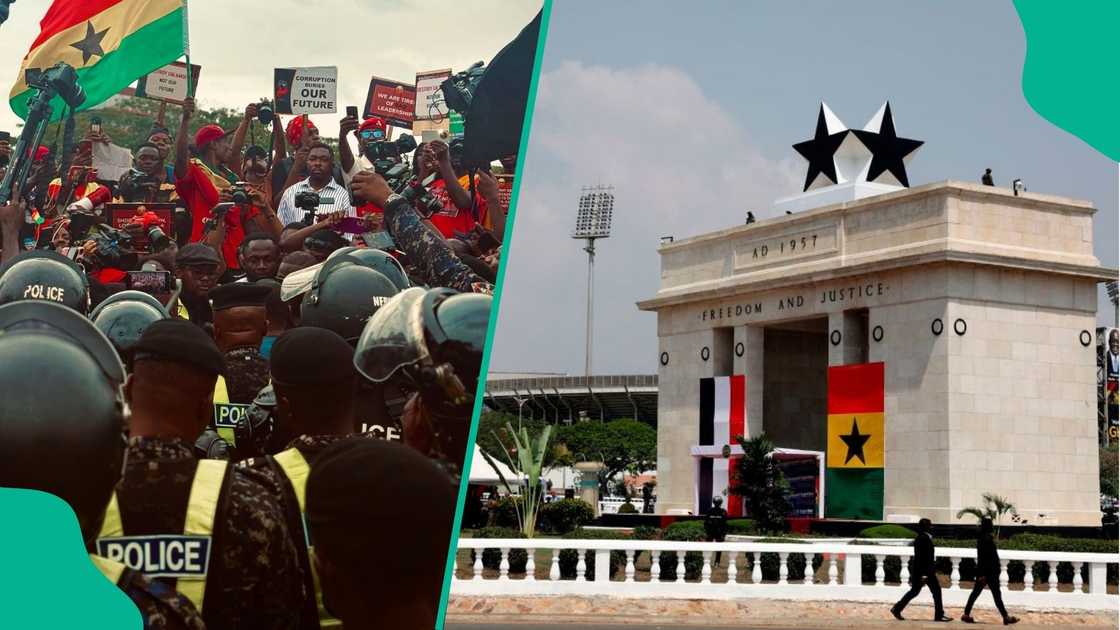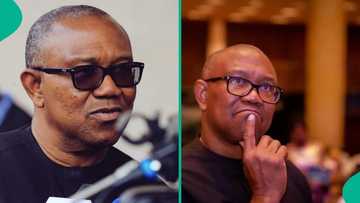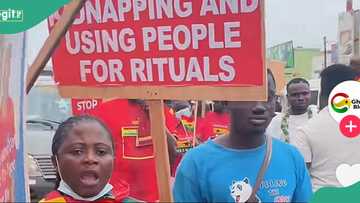Rethinking Why “Nigeria Must Go” and the Politics of Grievance in Ghana, by Lekan Olayiwola
Editor’s note: In this piece, peace researcher Lekan Olayiwola shares what it felt like to be Nigerian in Ghana during the “Nigeria Must Go” protest. His account urges understanding over division.
Shortly after I left Ghana for the third time in June 2025 to conduct a peace research, Accra erupted in a symbolic storm. A coronation meant to honour cultural ties between Nigeria and Ghana instead sparked an unexpected digital uprising.

Source: Twitter
In July, Accra witnessed another rupture. Hundreds of protesters took to the streets, chanting “Nigeria Must Go” — not as a call for xenophobic expulsion, but as a cry against unacknowledged harm. Placards bore messages like “Our kids are getting missing because of Igbos,” “Nigerians are kidnapping and using people for rituals,” and “They’ve hijacked our markets.” These were expressions of civic grief.
One of the loudest complaints from protesters was the alleged takeover of Ghanaian markets by Nigerian traders, particularly those of Igbo origin, dominating informal trade networks in villages and urban centres alike.

Read also
“It was not the boat': Junior Pope’s demise gets fresh twist as FG finally shares real cause of death
But Ghanaian grievances were not conjured out of thin air
I witnessed the emotional tension first-hand from a motor park scuffle where a Ghanaian driver questioned a Nigerian’s right to command a parking space, to a hotel manager’s hesitation in helping me register a SIM card, fearing misuse.
Even a Kumasi cab driver almost resorted to casting a spell, assuming I fit the stereotype of vanishing Nigerians. On my journey home, I was duped by a fellow Nigerian, while another Igbo man recounted escaping captivity from a fraudulent ring. These encounters don’t indict Nigerians; they underscore why Ghanaians may feel what they do.
But this isn’t just about trade. It’s about economic identity. When foreign traders become more visible than local ones, it triggers a sense of civic displacement; an economic hijack of one’s own country.
The most chilling protest was over allegations of ritual killings. Protesters cited missing children, mysterious deaths, and fears of spiritual violence.

Read also
"Don’t die for woman”: Yhemolee’s marriage reportedly in crisis, couple delete wedding pics from IG
While many of these claims remain unverified, they reflect a deep emotional wound, evoke ancestral trauma, spiritual fear, and the sense that life itself is being desecrated.
This is part of a wider regional pattern in which generational identity and civic participation are tightly linked. From Ghana’s #FixTheCountry protests to Nigeria’s #EndSARS, West African youth are redefining what it means to be citizens, not just subjects of traditional, state, or foreign power.
There’s a growing form of protest politics across Africa. It’s not just about economic inequality or material deprivation; it’s about symbolic extraction. The kind where diaspora elites or global influencers arrive with prestige, perform cultural rituals, and depart without engaging local realities.
Similar civic ruptures have occurred elsewhere
In South Africa, xenophobic violence against Nigerians, Zimbabweans, and Mozambicans has often been a misdirected outlet for youth frustrations over inequality and poor governance.

Read also
Breaking: "Nigerians must go,” FG breaks silence as Ghanaians protest alleged ritual killings
In Kenya, public backlash has emerged against political elites who use tribal symbolism and diaspora endorsements to mask corruption and exclude youth from decision-making. A 2023 University of Nairobi survey showed that over 60% of youth felt “culturally manipulated” by elite power plays.
In the Philippines, tensions have flared when foreign dignitaries or diaspora elites are accorded honours that appear to overshadow local sovereignty. The backlash against Chinese influence in ancestral lands has often fused cultural resistance with civic protest.
These examples show that civic erasure, not cultural diversity, is the real issue. When legitimacy is outsourced, youth often respond with protest.
“Nigeria must go” — A loaded phrase
The rallying cry of the protest—Nigeria Must Go—is not without historical weight. It echoes a painful chapter from 1983, when Nigeria expelled over a million West African migrants, many Ghanaian, in a brutal exercise of nationalist fervour.
But in this protest, the cry was repurposed. It wasn't a call for deportation; it was a metaphorical rejection of cultural imposition and economic domination without civic consent. For many youth, it channelled a deeper frustration: the feeling of being overstepped, overlooked, and overshadowed in their own national space.

Source: Getty Images
Grievance politics in a borderless region
This protest is part of a broader pattern across West Africa, where grievance politics is no longer just about poverty or unemployment, but about symbolic sovereignty. Citizens are asking: Who controls our markets? Who narrates our culture? Who protects our children?
When these questions fail to find satisfactory answers, protests erupt. That appears to be what Ghanaian youth are saying without mincing words.
Greed enters the picture when symbolic power is hoarded; when ceremonies, coronations, or cultural displays become unilateral exercises rather than dialogical moments of shared pride.
The Nigerian diaspora has extraordinary influence in shaping African narratives—from fashion to music to monarchy. But with that influence must come responsibility. Diaspora leaders must listen to local communities, respect civic space, and understand the emotional terrains they enter.
Civic visibility vs. cultural spectacle
One of the deepest ironies of the protest is that it amplified voices often left in the margins. Young Ghanaians reclaimed the narrative by reframing visibility. They turned the spotlight back toward themselves, not to block cross-cultural collaboration, but to ask: Where is our place in the cultural conversation?
Visibility is not the same as voice. The coronation had global optics, but Ghana’s youth were not part of the aesthetic frame. The spectacle silenced rather than celebrated them. In response, they made themselves unignorable.
What must change
This moment demands more than diplomatic calm. It requires civic reckoning.
For Nigeria, diaspora leaders must engage with host communities, not just celebrate culture. Nigerian traders must respect local laws and licensing frameworks. The Nigerian government must acknowledge the emotional impact of its diaspora footprint, especially in sensitive sectors.
For Ghana, youth must be included in cultural and economic policymaking. Allegations of ritual killings must be investigated transparently, not dismissed. Civic education must address xenophobia without silencing legitimate grievance.

Read also
Kano residents outraged over sexual harassment of young girls during school candy celebrations
For ECOWAS, cross-border civic protocols must be developed to guide diaspora conduct. Cultural diplomacy must be consent-based, not celebratory by default.
And if future diaspora events forget that?
Well, expect the hashtags to fly. Expect satire. Expect protest. Because grievance politics has gone digital, and it’s more effective than ever.
Lekan Olayiwola is a peace and conflict researcher and practitioner. He can be reached via lekanolayiwola@gmail.com.
Disclaimer: The views and opinions expressed here are those of the author and do not necessarily reflect the official policy or position of Legit.ng.
Source: Legit.ng




